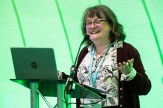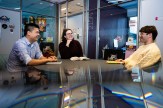Better call Khushal, the man who provides vital intel for Northeastern’s global network
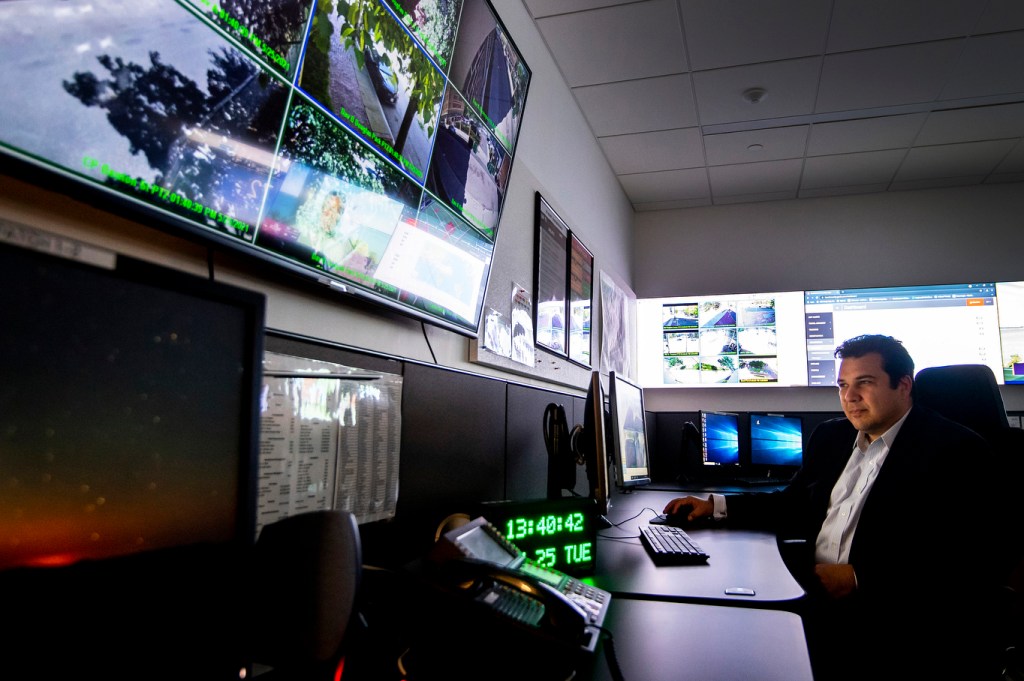
Khushal Safi is studying a large map of the world projected on a wall in Northeastern’s Emergency Operations Center. The lights are off, but the room is alive with TV screens shimmering with real-time news updates, chattering police scanners, live feeds from security cameras placed on and around the Boston campus, and attentive dispatchers working their computers for information from anywhere in the world.
Safi, who heads the international safety office at Northeastern, is focused on the map. On it, blue dots scattered across all seven continents represent more than 4,000 Northeastern students, faculty, and staff, as well as the facilities where they work, across the university’s global network.
Orange dots pop up here and there, too. These signify alerts about severe weather, social or political unrest, COVID-19 restrictions, or other potential security risks.
The orange dots have Safi’s attention because it is his job to ensure that members of the Northeastern community who are conducting global study, work, or research, or who are planning to travel, understand the risks associated with their sites. He and his team are responsible for surveying the sites where they plan to live, study, and conduct research, identifying any potential security threats, monitoring the globe for events that could disrupt their travel or work, and making sure they get the assistance they need—should they need it.
Safi is not there to keep them from traveling where there’s risk. His job is to make sure that they can do what they set out to do by preparing for, and taking into account, everything that could go wrong.
“I’m not a stop sign,” is how Safi—remarkably affable and easygoing, considering his job—sums up this role. “I help faculty, staff, and students create. That’s really the goal, right?”
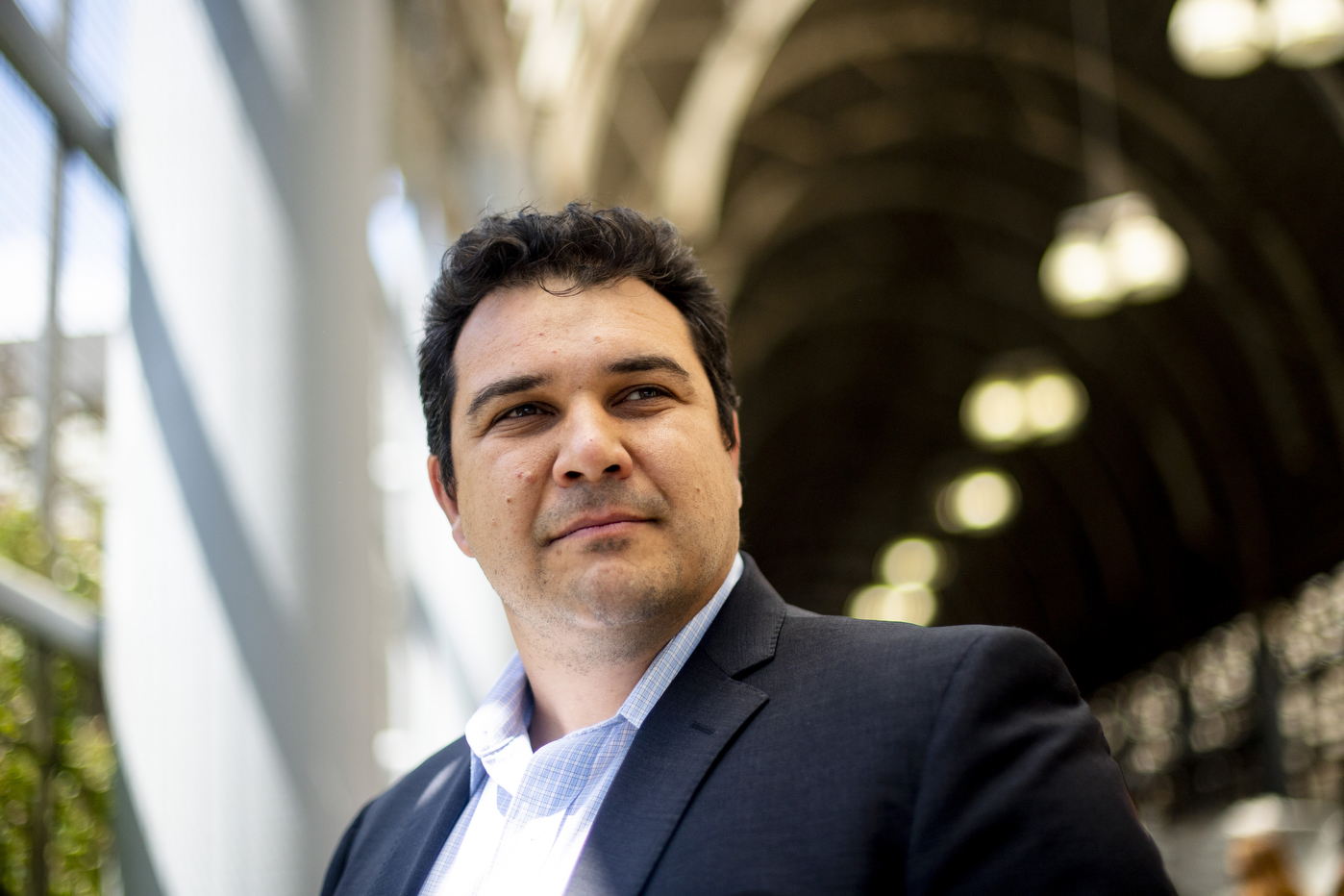
To do this, Safi draws on a career in counterintelligence operations that has taken him to many of the world’s hotspots, and a broad personal network of people that he can call on to assist students, faculty, and staff around the globe.
“He enables the university to be a mobile organization,” says Ken Henderson, chancellor and senior vice president for learning at Northeastern. “He is behind the scenes of every decision that’s made about the locations where we go.”
Safi also possesses a deep knowledge of the history and current state of conflicts and risks around the world. This enables him to assess situations and devise solutions that allow members of the Northeastern community to do their work, says Michael Davis, vice president for campus safety and policing and chief of the Northeastern University Police Department.
“He’s able to mobilize really quickly, and get in touch with people on the ground, assess what they need,” Davis says. “He can provide the risk considerations for going anywhere, because he has both the acumen for what it means to be safe, and also the network of services in security firms and other resources to make sure that that can actually happen.”
‘A builder of bridges’
Safi, who is 41, was born in Kuwait to a family originally from Kunar province, in eastern Afghanistan—a large Afghan flag flies in his office at Northeastern. After graduating from Salve Regina University in Rhode Island, he embarked on a decades-long career in the U.S. intelligence community that immersed him in the Middle East and Central Asia, before he joined Northeastern in 2014.
He’s also a leadership member of the Middle East and North Africa Advisory Council of the Overseas Security Advisory Council, a partnership between the U.S. Department of State and the private security sector. Under Safi’s guidance, Northeastern hosts an annual briefing of the Middle East and North Africa Regional Council for private sector security company executives.
“He is very much the builder of bridges, the person who can collaborate with anybody,” says a State Department official who works with Safi through the council but is not authorized to comment publicly. “The beauty of Khushal is that he’s always even-keeled and, and he’s unflappable. These are the people that you want handling your crisis response.”
He’s a wealth of information, and he is a little bit of a mystery man as well, whereas you can start talking to him and tapping into his knowledge and you get the feeling that it’s just the surface.
Regina Coppa, NUPD Sgt. Detective
Safi’s most recognizable trait—and the one that comes up in every discussion about him—is the way he talks to people, and creates positive relationships.
“And then the relationship starts to forge right because then he interacts with the diplomatic security guys in Boston, because we have that conference,” says the diplomat. “Then, more relationships are built and the bonds get stronger.
“He knows what questions to ask. He knows what questions not to ask. He knows that as he needs to get information, how to go about asking those questions in the proper manner so that red flags don’t pop up and people’s hackles don’t rise up.”
And yet, ask Khushal Safi about himself, and he won’t tell you much. He will tell you he loves spending time at the beach with his family, and that he loves taking his 19-foot Mako motor boat out on the water. He loves collecting high-end bourbon, and he has his phone on almost all the time for those calls that may come in at any time. He doesn’t mind if you call him ‘Khushal’ or ‘Safi’ (“because some people have trouble pronouncing my first name.”)
He gets you to tell him everything about yourself. But he doesn’t really talk about himself. He calls this a vestige of his career in intelligence.
“You just don’t share anything about yourself that tells you who I am inside,” he says, always with a smile.
‘The triage train’
In the emergency operations center, Safi describes the 24-hour system that keeps people safe. Students, faculty, and staff have access to security companies on the ground. They can call a hotline to get healthcare or travel support. And they can call his team of safety officers, Alyssa Berg, J.J. Cappa, and Nicholas Gauvin, which sets in motion the “triage train,” as Safi puts it—the university’s response to put people in the safest position possible.
At the outset of the COVID-19 pandemic, in the absence of good information from governmental authorities about the emerging crisis, Safi’s team relied on information from Northeastern public health experts and infectious disease modelers—including Alessandro Vespignani, who directs the Network Science Institute at Northeastern—as well as contacts with other universities, nongovernmental organizations, private security companies such as GardaWorld and Collinson Group, and insurers such as Travel Guard, to name a few.
Safi’s team’s briefings allowed the university to get students out of the countries where they may have been stuck in lockdowns long after their co-ops or semesters abroad ended, says Madeleine Estabrook, senior vice chancellor for student affairs.
When the university made the decision to recall students from global experiences in March 2020, says Chong Kim-Wong, vice chancellor and dean of students, “Khushal and his team were able to give us lots of information to be able to support our students in getting to whatever location they were looking to go to, or come back from.”
Northeastern reopened international programs and began reopening its campuses in July 2020, in conjunction with guidance from public health authorities and faculty experts. The university also based its decision-making on the risk assessment of Safi’s team, which incorporated the COVID-19 numbers in a particular country, as well as guidance from local public health authorities. The result was an approach that tailored the needs of each member of the university community with the situation on the ground.
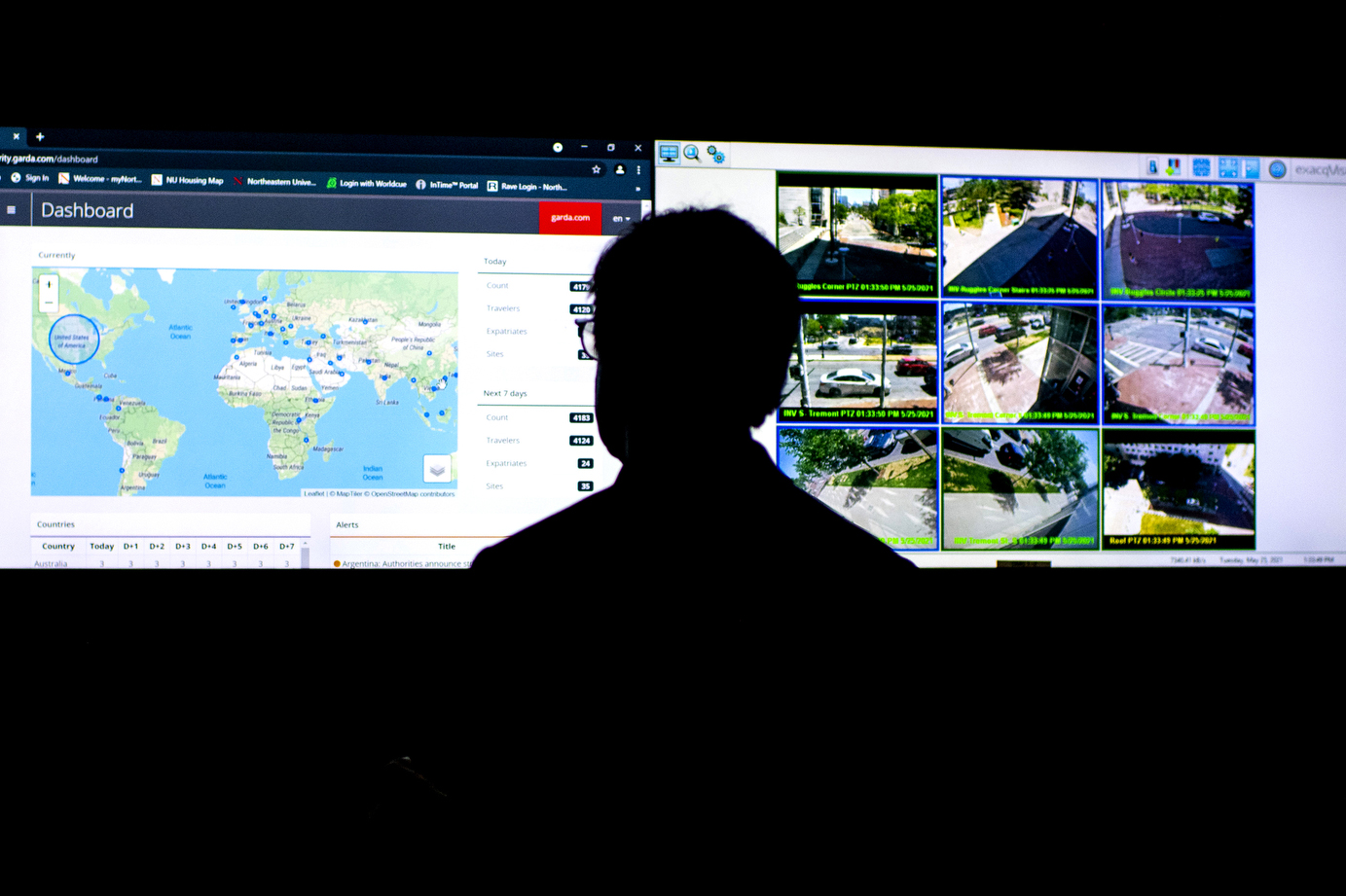
“We saw an opportunity to bring students back to campus or return to their international experiential learning,” Safi says. “We updated our systems so that we could meet with students, faculty, or staff planning university travel to provide them with the latest immigration, public health, and security assessments for the destination they were planning to travel.”
This allowed the university to continue global experiential learning “where most schools said, ‘No, we’re not doing it,’” Safi says.
“He’s a wealth of information, and he is a little bit of a mystery man as well, whereas you can start talking to him and tapping into his knowledge and you get the feeling that it’s just the surface,” says NUPD Sgt. Detective Regina Coppa, who is in charge of security at Northeastern’s campuses in Charlotte, North Carolina; Portland, Maine; Toronto; Vancouver; Seattle; the Bay Area; and London.
“If we have a student stuck at the border who can’t get in, or if there’s an issue with paperwork at the border, if there’s an issue with maybe particular types of protests—activism in the area due to cultural clashes, right—that’s all of the knowledge that he brings to the table,” she says.
‘A gift for seeing the big picture’
Often the response to a crisis involves not just removing people from situations, but devising ways to allow students, faculty, and staff to continue their work. Safi’s team’s goal is to ensure that they familiarize themselves with the risks in advance, make use of local resources, and learn about where they will be living and working before they go.
“Ninety percent of security is the preparation that you do in advance,” Safi says. “Any time you put down roots, now you’ve got a network that you can go back to safely.”
Safi’s in-depth knowledge of the Middle East helped Brian Helmuth, a professor of marine and environmental science at Northeastern’s Marine Science Center, complete a visit to southern Iraq, where one of the remaining fragments of marshland that had historically stretched over 7,000 square miles around the confluence of the Tigris and Euphrates rivers is now under threat because of manmade intervention.
But the area is also a place where the residual tensions of the civil war in Iraq occasionally boil over into violence, bombings, and kidnappings. Helmuth had received a State Department grant to work with the University of Basrah, but he did not have a full picture of the extent of the risks, Safi recalls.
So, Safi’s team went into action. He got in contact with security firms in the area to arrange for armored cars and guards. He connected with officials at the University of Basrah to work out a plan to keep Helmuth as safe as possible. He also found a way to safely bring into Iraq the special sensors Helmuth uses for his work.
“A lot of these are like boxes of wires, and you can imagine, flying into what is essentially a war zone with what looks like an I.E.D. would not have gone over well,” Helmuth recalls, using shorthand to describe an improvised explosive device, or homemade bomb. “That’s one of those instances where in hindsight, it made perfect sense, but I didn’t think about that at the time.”
Such minute details, as well as the overall preparation coordinated by Safi, made the trip possible, Helmuth says.
“He’s got this real gift for seeing the big picture. And, for finding solutions to it,” Helmuth says. “So he’s not there to serve as a roadblock, to say, ‘You can’t do this because it’s dangerous.’”
“He’s there to say, ‘Well, how do we make this work?’”
For media inquiries, please contact media@northeastern.edu.
